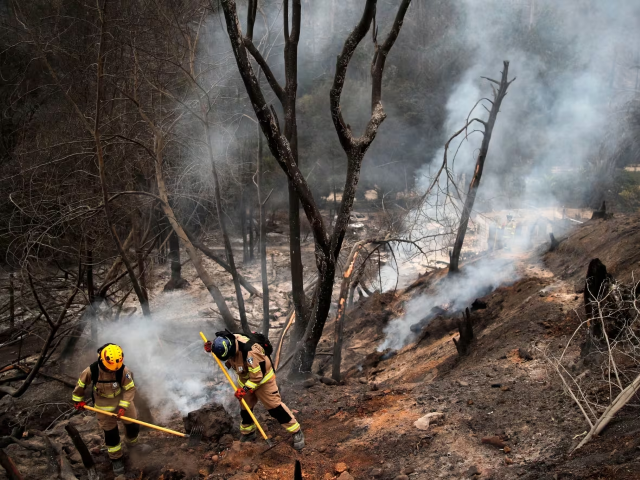
Firefighters are actively engaged in tackling the aftermath of a forest fire in Viña del Mar, Chile, as depicted in images from Sunday. The fires have particularly ravaged the coastal resort city, with the highest intensity observed in that vicinity (Javier Torres/AFP/Getty Images).
In a heart-wrenching saga, Chile is grappling with a catastrophe of unprecedented proportions as massive forest fires, ignited just two days ago in central regions, continue to unleash havoc. The toll has risen to at least 64 lives lost, and the city of Viña del Mar stands as a tragic testament to the unyielding fury of the flames.
Sunday marked a day of despair as firefighters battled relentlessly to contain the inferno that ruthlessly swept through the picturesque landscape. Viña del Mar, a popular beach resort, found itself at the epicentre of the devastation. The renowned botanical garden, a symbol of natural beauty since 1931, was reduced to ashes, leaving over 1,600 residents without shelter.
Tragically, the fires have not spared the neighbourhoods on the eastern fringes of Viña del Mar. Houses consumed by the relentless blaze have become tombs for some, as residents find themselves trapped in a terrifying dance with smoke and fire. Reports indicate that 200 people are missing in the city and its surroundings, further deepening the sense of dread and uncertainty.
Amidst the chaos, Rodrigo Mundaca, governor of the Valparaiso region, voiced suspicions of foul play. Echoing earlier sentiments by President Gabriel Boric, Mundaca suggested that some fires might have been deliberately ignited. "These fires began in four points that lit up simultaneously," he declared, emphasizing the urgency to meticulously investigate and bring those responsible to justice.
The initial outbreak occurred in remote, mountainous forested areas around Viña del Mar, posing substantial challenges for firefighting efforts. However, against all odds, the flames breached the city's outskirts, devouring densely populated neighbourhoods. Despite the valiant efforts of Chilean authorities, the relentless advance of the fires remains unchecked.
President Boric, grappling with the grim reality on the ground, acknowledged the formidable trifecta of unusually high temperatures, low humidity, and fierce winds exacerbating the crisis. Over 8,000 hectares of precious forests and urban spaces have succumbed to the relentless inferno.
As desperation grows, officials are urging residents in affected areas to evacuate promptly. Meanwhile, those at a safer distance are advised to remain indoors, facilitating the passage of fire engines and ambulances. The gravity of the situation has prompted the declaration of curfews in Viña del Mar, Quilpué, and Villa Alemana, aimed at preventing opportunistic looting.
This catastrophe unfolds against the backdrop of a week marked by record-high temperatures in central Chile. A persisting El Niño weather pattern has exacerbated drought conditions and elevated temperatures across western South America, heightening the susceptibility to devastating wildfires.
In this darkest hour, Chile finds itself in a race against time and nature, confronting a tragedy that defies both prediction and comprehension.















